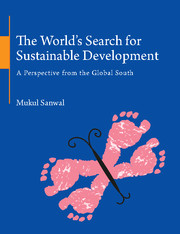Book contents
- Frontmatter
- Dedication
- Contents
- Preface
- Acknowledgments
- Abbreviations
- INTRODUCTION
- 1 Social Dimension of Sustainability
- CONSUMPTION IN AN UNEQUAL WORLD: FRAMING INTERNATIONAL COOPERATION
- CLIMATE POLICY: GLOBAL TO NATIONAL
- SUSTAINABLE DEVELOPMENT: NATIONAL TO GLOBAL
- CONSUMPTION IN A MORE EQUAL WORLD: SHAPING SOCIETAL FUNCTIONS
- GEOPOLITICS TO GEOECONOMICS: RURAL–URBAN DIVIDE, RATHER THAN BETWEEN COUNTRIES
- 21 Urban Areas: Sustainable Development and Human Well-being
- 22 Rural Areas: Climate Change, Fragile States and Human Security
- 23 Global Sustainable Development Goals
- 24 Transformative Impact of the Re-Emergence of China
- THE ASIAN CENTURY
- Index
23 - Global Sustainable Development Goals
from GEOPOLITICS TO GEOECONOMICS: RURAL–URBAN DIVIDE, RATHER THAN BETWEEN COUNTRIES
Published online by Cambridge University Press: 18 December 2015
- Frontmatter
- Dedication
- Contents
- Preface
- Acknowledgments
- Abbreviations
- INTRODUCTION
- 1 Social Dimension of Sustainability
- CONSUMPTION IN AN UNEQUAL WORLD: FRAMING INTERNATIONAL COOPERATION
- CLIMATE POLICY: GLOBAL TO NATIONAL
- SUSTAINABLE DEVELOPMENT: NATIONAL TO GLOBAL
- CONSUMPTION IN A MORE EQUAL WORLD: SHAPING SOCIETAL FUNCTIONS
- GEOPOLITICS TO GEOECONOMICS: RURAL–URBAN DIVIDE, RATHER THAN BETWEEN COUNTRIES
- 21 Urban Areas: Sustainable Development and Human Well-being
- 22 Rural Areas: Climate Change, Fragile States and Human Security
- 23 Global Sustainable Development Goals
- 24 Transformative Impact of the Re-Emergence of China
- THE ASIAN CENTURY
- Index
Summary
Societal well-being in the twenty-first century
For the first time global goals that will impose some obligations on all countries are being considered, because the re-emergence of China and India is leading to a spread of prosperity and power very different to the post-colonial world. The current model for sustainable development is three separate but connected pillars of environment, society and economy, with the implication that each sector is, at least in part, independent of the others. This framework reflected the natural resource use patterns of an industrializing economy that shaped urbanization and growth in the twentieth century. In the twenty-first century, re-emerging countries are increasingly adopting a new growth model and urban design stressing the social dimension and the knowledge economy, which is the first transformation since the beginning of civilization not based on increasing use of natural resources. Services already contribute a large part of GDP in emerging countries. Even in low-income countries, young workers leaving the farm for the cities are increasingly absorbed into urban services jobs instead of only in manufacturing. International trade in services has tended to expand more rapidly than trade in goods. Service industries could serve as a growth escalator, the role traditionally assumed by manufacturing, with much less natural resource use in their consumption patterns and different notions of well-being.
Defenders of the status quo, largely in industrialized countries, see the root cause of the problems with achieving sustainable development in the lack of capabilities – scientific knowledge, information and appropriate mechanisms – rather than in the overlap and interaction between the three pillars. The growing involvement of the social sciences, in part because of the issues raised by the re-emerging countries, is now emphasizing that the scope of the impact of human activities on the life support system, consequential on the shift in the population from rural to urban areas, is such that the biophysical and socio-economic forces are interdependent and interconnected across sectors and countries with the trends shaped by levels of development, or urbanization.
The nature of the change with urbanization, industrialization and middle-class levels of well-being, or economic development, involves a fundamental linkage in patterns of natural resource use across international borders.
- Type
- Chapter
- Information
- The World's Search for Sustainable DevelopmentA Perspective from the Global South, pp. 274 - 284Publisher: Cambridge University PressPrint publication year: 2015

